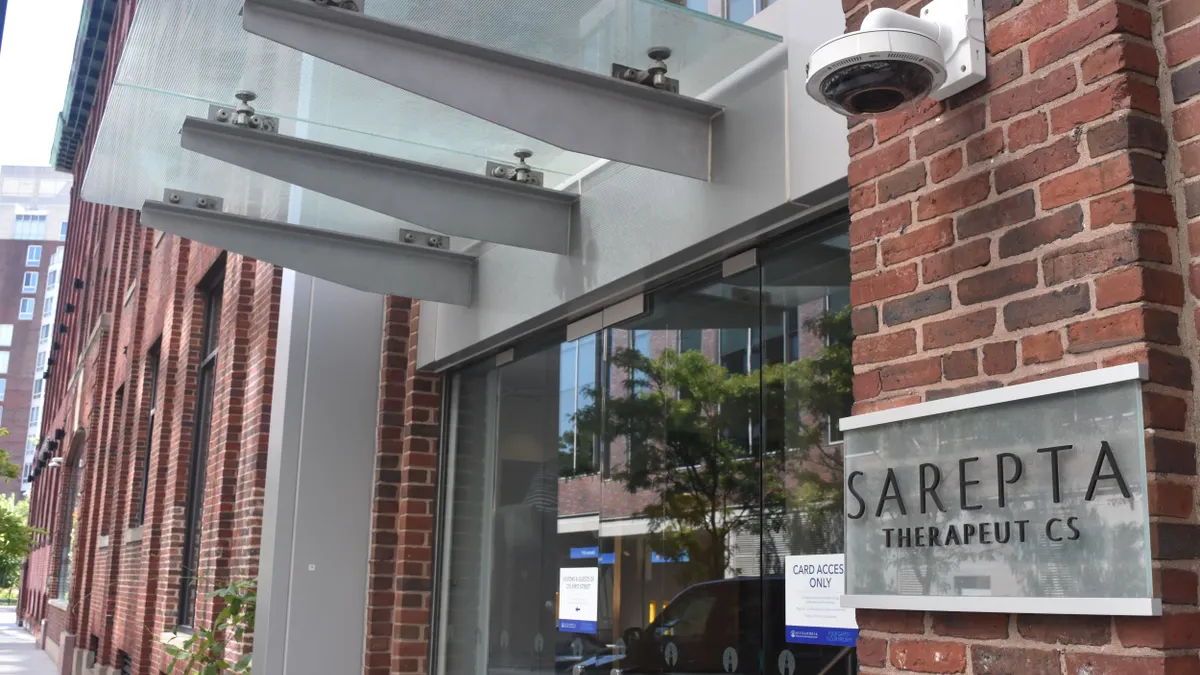Dive Brief:
- Sarepta Therapeutics intends to seek full U.S. clearance for a pair of Duchenne muscular dystrophy medicines even though the two treatments failed a study designed to confirm the benefits observed in earlier testing.
- According to Sarepta, after 96 weeks of treatment, patients receiving the drugs, Vyondys 53 and Amondys 45, instead of a placebo didn’t achieve statistically significant benefits on the study’s main objective, a measure of how quickly they can climb four steps. Sarepta, however, said Monday that the nine-year study, called Essence, was compromised by the COVID-19 pandemic and that the medicines demonstrated “consistent clinically favorable trends.”
- On a conference call with analysts, Sarepta CEO Doug Ingram said the company intends to meet with the agency to discuss converting the accelerated approvals for Vyondys 53 and Amondys 45 into traditional clearances. Despite the study’s failure, “we believe we have a good argument,” he said, noting the “totality of the evidence” generated to date, which includes years of testing and real-world use.
Dive Insight:
Sarepta has been a key beneficiary of the FDA’s accelerated approval pathway, which allows drugs to reach market faster than they would otherwise on the condition that they prove impactful in confirmatory testing. All four of its marketed products — three “exon-skipping” medicines and one gene therapy — were granted speedy clearances based on their ability to boost levels of a protein expected, but not proven, to help patients with the disease.
Sarepta has built a business off of those four therapies, which are each available to different segments of Duchenne patients. Combined, they generated close to $2 billion in revenue last year and another $1.1 billion over the first nine months of 2025, according to quarterly results announced Monday. But the company hasn’t yet clearly shown, in follow-up testing, that those therapies can clearly help people with Duchenne.
With Sarepta’s first approved drug, Exondys 51, the FDA only required a post-marketing study that evaluates whether higher doses are more beneficial, not whether it slows disease progression overall. Sarepta’s gene therapy, Elevidys, fell short in a late-stage trial meant to uphold its benefits. Now, its two other Vyondys and Amondys, have missed the main objective of a confirmatory trial, too.
Drugs that fail these types of trials are vulnerable to being pulled from the market. Ingram, though, told analysts he doesn’t believe Sarepta faces that risk with Vyondys and Amondys.
According to Ingram, during the COVID-19 pandemic, the rate of missed drug doses in the trial was “unusually high,” and study participants were “largely shut in,” negatively affecting their conditioning and mobility. The wide age range of study enrollees led to distorted overall results, whereas Sarepta saw a clear benefit among patients likely to progress. “Multiple real-world studies” have demonstrated the drugs’ impacts on disease trajectory too, he argued.
Ingram also revealed that, upon approving Vyondys and discussing the confirmatory study with Sarepta, the FDA said it would only call for a withdrawal “in a scenario where no relevant analysis would confirm a clinical benefit.”
Withdrawing the drugs “would make very little sense, given the benefits we’ve seen with these therapies and the extraordinarily beneficial safety profile that we’ve seen over the years,” Ingram said.
Still, the results add new uncertainty to Sarepta’s business. While Elevidys sales of about $132 million beat consensus quarterly estimates, the public drama surrounding the therapy’s safety and temporary withdrawal last summer have raised questions from analysts about its future trajectory. Sarepta derives the bulk of its revenue from its other three medicines, and its next prospects — drugs it’s developing with Arrowhead Pharmaceuticals — are in early testing.
The study failure “adds incrementally more susceptibility of this core revenue to regulatory risk, payer pushback, and emerging competition,” wrote RBC Capital Markets analyst Brian Abrahams on Monday.
Sarepta shares fell nearly 40% and have lost most of their value since peaking at more than $160 apiece in June 2024.














